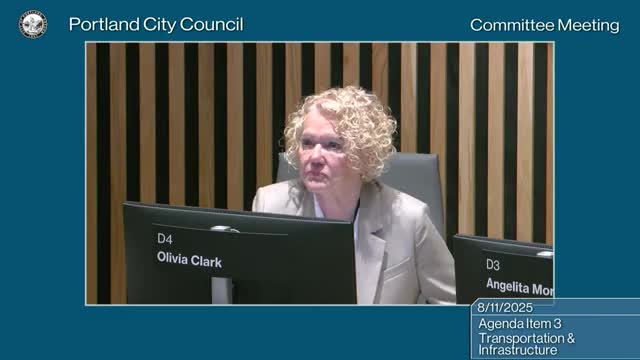Fiscal Concerns Emerge Over Interstate Bridge Replacement Project Cost Estimates
August 12, 2025 | Portland, Multnomah County, Oregon
This article was created by AI summarizing key points discussed. AI makes mistakes, so for full details and context, please refer to the video of the full meeting. Please report any errors so we can fix them. Report an error »

Concerns over the Interstate Bridge Replacement Project dominated the Portland City Council Transportation & Infrastructure Committee meeting on August 11, 2025, as experts and advocates raised alarms about escalating costs, traffic projections, and environmental impacts.
Critics highlighted that the project's cost estimates, dating back to 2022, are outdated and likely to exceed $10 billion, significantly higher than the initial $7.5 billion projection. Greg Johnson, a key figure in the project, has repeatedly delayed the release of updated estimates, raising fears of fiscal mismanagement. "You should be very, very afraid from a fiscal standpoint," warned one speaker, emphasizing the history of cost overruns in similar projects.
Traffic patterns were also a focal point of discussion. While the project is designed to accommodate 143,000 vehicles daily, current data shows usage has dropped to 127,000, a decline of over 10%. Critics argue that the project is based on flawed assumptions, predicting a 25% increase in vehicle miles traveled, contrary to state climate goals aimed at reducing such metrics by 12% over the next two decades.
Sarah Iannarone, executive director of The Street Trust, stressed the need for the project to prioritize multimodal transportation, ensuring safe and accessible options for pedestrians and cyclists. "If our concerns about safety and accessibility are not addressed, our support for this project will be withdrawn entirely," she stated, highlighting the importance of including non-drivers in the planning process.
The meeting also featured testimony from freight industry representatives, who underscored the bridge's critical role in Oregon's economy. With over 13,500 freight trucks crossing daily, the bridge is deemed essential for maintaining efficient goods movement. However, concerns about its seismic safety were raised, with calls for a replacement that meets modern standards.
As the committee continues to deliberate, the future of the Interstate Bridge Replacement Project hangs in the balance, with advocates urging a comprehensive approach that aligns with fiscal responsibility, traffic realities, and climate commitments.
Critics highlighted that the project's cost estimates, dating back to 2022, are outdated and likely to exceed $10 billion, significantly higher than the initial $7.5 billion projection. Greg Johnson, a key figure in the project, has repeatedly delayed the release of updated estimates, raising fears of fiscal mismanagement. "You should be very, very afraid from a fiscal standpoint," warned one speaker, emphasizing the history of cost overruns in similar projects.
Traffic patterns were also a focal point of discussion. While the project is designed to accommodate 143,000 vehicles daily, current data shows usage has dropped to 127,000, a decline of over 10%. Critics argue that the project is based on flawed assumptions, predicting a 25% increase in vehicle miles traveled, contrary to state climate goals aimed at reducing such metrics by 12% over the next two decades.
Sarah Iannarone, executive director of The Street Trust, stressed the need for the project to prioritize multimodal transportation, ensuring safe and accessible options for pedestrians and cyclists. "If our concerns about safety and accessibility are not addressed, our support for this project will be withdrawn entirely," she stated, highlighting the importance of including non-drivers in the planning process.
The meeting also featured testimony from freight industry representatives, who underscored the bridge's critical role in Oregon's economy. With over 13,500 freight trucks crossing daily, the bridge is deemed essential for maintaining efficient goods movement. However, concerns about its seismic safety were raised, with calls for a replacement that meets modern standards.
As the committee continues to deliberate, the future of the Interstate Bridge Replacement Project hangs in the balance, with advocates urging a comprehensive approach that aligns with fiscal responsibility, traffic realities, and climate commitments.
View full meeting
This article is based on a recent meeting—watch the full video and explore the complete transcript for deeper insights into the discussion.
View full meeting
